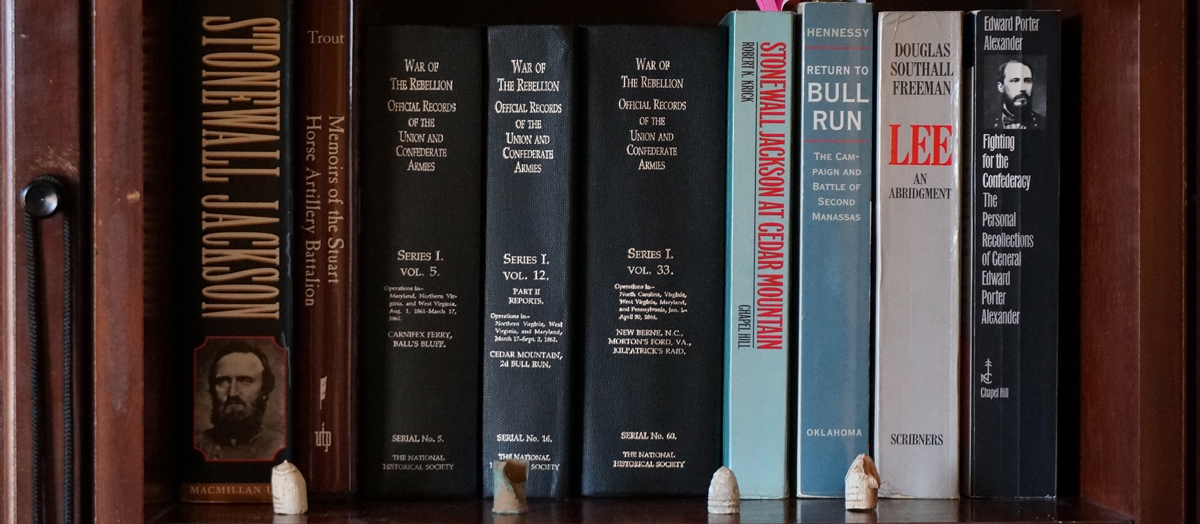No. 64.
Report of Maj. A. R. Courtney, C. S. Army, Chief of Artillery, Third Division.
Headquarters Third Division,
August 15, 1862.
Sir: I beg leave respectfully to make the following report of the operations of the artillery in this division in the fight of the 9th instant, at Mrs. Crittenden’s farm, near Slaughter Mountain, Culpeper County, Virginia.
The battle was opened by the artillery of this division, which had been posted as presently [below] described, with orders not to fire until the infantry sent around to the left to fire upon the enemy’s cavalry skirmishers had opened. Captain Dement’s (First Maryland) battery, Captain Brown’s Chesapeake Artillery, also from Maryland; Captain D’Aquin’s (Louisiana) battery, and the rifle gun of Captain Latimer’s battery were posted in a line from the main road, on the left of the mountain, on the right, and as far forward as Majors’ house. Captain Latimer, with three guns, and Lieutenant Terry, with Captain Johnson’s (Bedford) battery, were stationed by the major-general in person on Slaughter Mountain near the mansion house. From these positions the several batteries named opened upon a large body of cavalry in front as soon as the infantry opened upon their advanced guard from the woods on the left. The cavalry having at once fled, and the enemy opening with several batteries in our font and beyond effective range of our guns, I ordered the batteries on the plain to cease firing, and conducted them forward to the positions afterward taken and held by them until dark, Captain Latimer and Lieutenant Terry continuing their fire from the mountain. I ordered Captain Latimer’s rifle to join the battery on the mountain, and leaving three of Captain Brown’s guns (two old 6-pounders and a howitzer), I carried the rest directly forward and posted Captain Dement, with two of his Napoleon guns, and Captain Brown, with his 3-inch rifle, on a little rise on the right of General Early’s brigade, on which there is a little clump of cedars and pines, about 600 yards from the enemy’s extreme right battery. The other section of Captain Dement’s battery (two Napoleons) and Captain D’Aquin’s battery — now having only three guns, having broken the axle of one in crossing the rough fields to get his position — I posted along a ridge behind Mrs. Crittenden’s house, i. e., between it and the enemy’s battery and about 800 yards from the battery on their extreme left. From these positions the batteries opened upon the batteries immediately in their front as soon as they took their positions and continued until dark, their ammunition fortunately lasting just until then. Captain Latimer and Lieutenant Terry kept their positions on the mountain during the fight and kept up a constant fire.
Though the effect of our artillery fire upon their batteries was evidently terrible, the enemy obstinately held their positions, except to move their pieces a little to the right or left occasionally to escape the deadly shower, and moving the battery on their right back to a knoll 300 yards in rear soon after, they were fired on by the three guns of Captains Dement and Brown behind the clump of cedars.
About sundown, the ammunition being exhausted, the guns which had been in action on the plain and were under my immediate command were ordered to the rear, and Captain Brown’s three guns and Captain Rivera, with two Parrott guns — which had been kept out during the day on account of the want of experience of the company — were sent forward to take their place, but these did not fire. Captain Latimer and Lieutenant Terry [sic] about the same time. The enemy being drawn back, both infantry and artillery were ordered forward by the major-general.
As to the conduct of officers and men of those batteries on the plain — to which I confined my attention — I can but speak in the highest terms. The officers and men of Captan Dement’s (First Maryland) battery — the only one which had been in action before — showed more coolness and deliberation; but all, without a single exception, so far as my own knowledge goes or has been reported by company officers, were fired with the ardor of men determined to be free.
Of Captain Latimer and Lieutenant Terry and their respective commands I am not able to speak, but I am informed they were under the eye of the major-general himself for most of the time, and it is not necessary.
The Manchester Artillery, being very thinly manned, was left in the rear.
The whole number of guns of this division engaged was 16. Of these 6 were Napoleons, 3 6-pounders, 3 12-pounder howitzers, and 4 3-inch Burton rifles.
Very respectfully, your obedient servant,
A. R. COURTNEY,
Chief of Artillery, Third Division.
Major-General Ewell.

